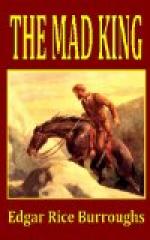At the stables Butzow requisitioned three horses, and soon the trio was galloping through a little-frequented street toward the northern, hilly environs of Lustadt. They rode in silence until they came to an old stone building, whose boarded windows and general appearance of dilapidation proclaimed its long tenantless condition. Rank weeds, now rustling dry and yellow in the November wind, choked what once might have been a luxuriant garden. A stone wall, which had at one time entirely surrounded the grounds, had been almost completely removed from the front to serve as foundation stone for a smaller edifice farther down the mountainside.
The horsemen avoided this break in the wall, coming up instead upon the rear side where their approach was wholly screened from the building by the wall upon that exposure.
Close in they dismounted, and leaving the animals in charge of the shopkeeper of Tafelberg, Barney and Butzow hastened toward a small postern-gate which swung, groaning, upon a single rusted hinge. Each felt that there was no time for caution or stratagem. Instead all depended upon the very boldness and rashness of their attack, and so as they came through into the courtyard the two dashed headlong for the building.
Chance accomplished for them what no amount of careful execution might have done, and they came within the ruin unnoticed by the four who occupied the old, darkened library.
Possibly the fact that one of the men had himself just entered and was excitedly talking to the others may have drowned the noisy approach of the two. However that may be, it is a fact that Barney and the cavalry officer came to the very door of the library unheard.
There they halted, listening. Coblich was speaking.
“The Regent commands it, Maenck,” he was saying. “It is the only thing that can save our necks. He said that you had better be the one to do it, since it was your carelessness that permitted the fellow to escape from Blentz.”
Huddled in a far corner of the room was an abject figure trembling in terror. At the words of Coblich it staggered to its feet. It was the king.
“Have pity—have pity!” he cried. “Do not kill me, and I will go away where none will ever know that I live. You can tell Peter that I am dead. Tell him anything, only spare my life. Oh, why did I ever listen to the cursed fool who tempted me to think of regaining the crown that has brought me only misery and suffering—the crown that has now placed the sentence of death upon me.”
“Why not let him go?” suggested the trooper, who up to this time had not spoken. “If we don’t kill him, we can’t be hanged for his murder.”
“Don’t be too sure of that,” exclaimed Maenck. “If he goes away and never returns, what proof can we offer that we did not kill him, should we be charged with the crime? And if we let him go, and later he returns and gains his throne, he will see that we are hanged anyway for treason.




